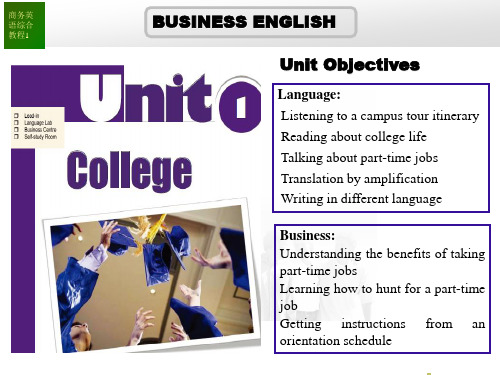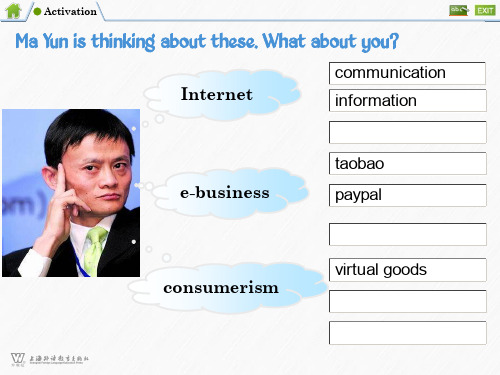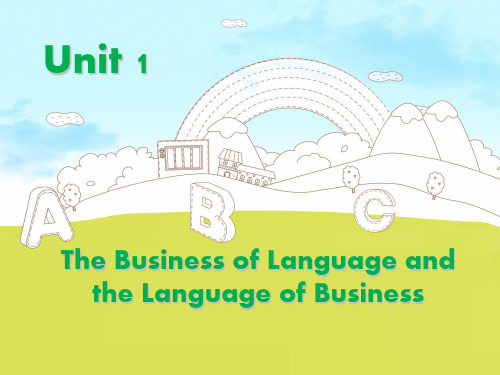现代商务英语综合教程第一册Chapter 1
商务英语综合教程(上册)Unit 1 Advertising

attracting customers. In practically every such program some form of advertising is used. The type of advertising selected and the amount of money devoted to it depend on the nature of each individual business.
Text
Unit 1 Advertising
9 A department store in a large city has a more
complicated problem. It has to draw its customers from areas far beyond walking distance of its location. A much more aggressive advertising program is therefore necessary. Department stores use a combination of advertising methods. They run advertisements in newspapers and other periodicals, mail brochures and catalogues to potential customers, and insert special advertisements in monthly statements to charge-account customers. Many department stores also advertise on the radio and television.
综合英语课程Unit1

7. Singapore 8. Germany
< Back Next > Home
商务英 语综合 教程1
Lead-in
Task 2 Describe the following campus activities and tell which interests you most.
< Back
Next >
< Back
Next >
Home
商务英 语综合 教程1
Lead-in
Task 3 Listen and fill in the following blanks. Script:
Campus guided tours are led by our specially selected team of UW students who combine knowledge of our historic campus with information about the student experience. During the tour you’ll have the chance to ask questions about academics, living on campus, research opportunities, studying abroad, and all the great things to do in the Emerald City. Guided tours are offered Monday through Friday, at 10:00 a.m. and 2:00 p.m. They leave from Schmitz Hall, 3rd floor lobby, and last 70 minutes. They are also offered on Saturdays and Sundays beginning at 10:30 a.m. and leaving from the Statue of George Washington. On state holidays or the Saturday following a state holiday, tours are not offered.
综合英语教程第一册Unit One My first job

Topic: Unit 1 My First JobTeaching Objectives:1. Function: greetings & farewells2. Grammatical Point: this/that be + n. or adj.Teaching Methods:Lecture; Pair work; DiscussionThe Important/Difficult Points:1. The basic concepts of first/given and last/family names2. The structures for identifying/introducing people3. Practicing classroom English4. Practicing different ways of greeting and introducing/identifying people5. The meanings and usage of some colloquial, routinized expressions6. The cultural implications in the proverbTeaching Procedures:P1 Listening and Speaking Activities1. Introduction of functions1) Greet the class and introduce yourself by using some pictures to familiarize the students withthe basic concepts of first/given and last/family names and the structures for identifying/introducing people.2) Activity 1: Draw a rough sketch of themselves or somebody they know, and then ask eachother questions about the pictures they are showing to each other.3) Summarize the questions and structures used in performing the function of greetings andfarewells.2. Listen and speak1) Ask the students to identify the job of the woman in the picture, and then speak on her behalf.Get the students to fill up the blanks while listening to you. Lastly, check the answers.2) Play the tape one or two times and get them to do Conversation One and Two. Then, selectsome students to give answers. Lastly, check the answers and correct mistakes in their pronunciation if any.3) Key points:“I’m” is more common in speaking than “I am” which is often used for the emphatic purpose in such a contrast as “but he isn’t”. Other contractions often used in conversational English include the following: it’s = it is/has I’d like = I would like he’s = he is/has let’s = let us you’re = you are don’t = do not3. Try to speak moreConversation One:1) Explain the language in Conversation One by using Useful Structures and Expressions. Then,organize reading aloud practice and correct pronunciation problems.2) Have the students make a new conversation by using the substitutes word. Then, have one ortwo pairs of students present the conversations they have made up.3) Ask questions to check their understanding of first name and last name/family name.4) Key points:Friendly greetings can be followed by an offer of help: Hi, may I help you?Possible answers: No. Thank you. I have been helped. I’m being helped.Introduce middle name and initials such as: Allen D. Wallace A.D. WallaceIn some types of writing, such as dictionary entry or bibliography, a person’s name can also be written in the form: Wallace, A.D.Conversation Two:1) Have the students read aloud, check their pronunciation. Then, ask them to make a newconversation by using the substitutes. After that, have one or two pairs of students demonstrate the dialogue they have made. Finally, highlight Useful Structures and Expressions by writing them on the blackboard.2) Key points:Will + be + v-ing: the future continuous tense for a scheduled event which is coming soon.It’s been nice talking to you: In American English, people also use “It’s nice to talk to you.”Goodbye and good luck: A farewell used especially when you and your friend are not expected to see each other for a long time.I’m flying back…: The present continuous tense indicates a scheduled action in the near future.write to: write a letter/an e-email tohave a happy landing: a farewell used only to people who are going to make a plane trip3) Activity 2: Spelling games.4. Make your own dialogueMonologue:1) Explain the monologue and present the key expressions on the blackboard. Then, have themread the passage aloud. After that, ask the students to draft a similar farewell speech. Have them exchange their speeches and correct each other’s errors, if any. At last, have two or more students present their speeches to the class. Comment on their presentations and ask the students for their comments as well.2) Key points:We know why…a sad job…to Put my feelings to words I’m lucky toTomorrow I’ll…I’ll ThanksConversation:1) Explain the language points first, and then have the students act out the conversation. Afterthat, have them make up their own conversations. Have two or more pairs present their own conversations. Comment on their work and correct language errors, if any.2) Key points:To be polite, one usually introduces oneself first before asking for the name of the person one is talking to. Similarly, one gives information about where one is from first.5. What are they for?1) Pair work: One reads the actual words spoken and the other matches them with the functions.2) Key points:Some sentences, such as, “Let’s have lunch sometime”, though often used at parting, is not necessarily intended as a real invitation. A real invitation should involve a definite time and location for the meeting.How are you getting on?: a greeting often used among friends or acquaintancesFancy meeting you here!: a greeting used in a chance encounter, spoken in a high pitch that reflects excitement and high spirits6. If you want to learn more1) Have the students read the sentences, and then ask a few students explain when and wherethe sentences are used. Finally, have them read the exercise aloud and try to memorize them.2) Key point:Couldn’t be better: The sentence is comparative in form but superlative in meaning.7. Proverb1) Have the students translate the proverb into Chinese.2) Activity 3: A class discussion about what counts as a good beginning for English study in thecollege. Provide the following clues as lead-ins:Adopting a right attitude.Setting a goal for one’s study. For ex ample, learn five words a day.Setting up a pattern of study. For example, practice pronunciation for 15 minutes a day.Assignment:1. Review what we have learnt today, and prepare a short speech for next class.2. Preview the text in P2.Evaluation:。
综合商务英语1(已完成)MARKET LEADER unit 1

C) Kiss
Kissing on the hand is a special form to making greetings. In Europe and Latin America, the man general kisses on the hand of the woman on formal occasions.
a) Don not shake hands absent-mindedly;
b) Don not shake hands with the left hand;
c) Don not shake hands while wearing a hat, gloves, or sunglasses;
d) Don not shake hands with your other hand in the pocket;
On most occasions, handshaking is an expression of courtesy and greeting when people meet or say goodbye to each other. Six don’ts should be remembered:
Greetings
I. What’s important about making greetings? 1) Take notice of other people; 2) Be confident to make a good impression; 3) Be polite and genuine;
III. What does it mean to different people?
1) For some, it focuses on vocabulary and topics used in the worlds of business, trade, finance, and international trade;
商务英语综合教程第一学期习题答案

Unit 1 Company Profile1.Translate the following Chinese terms into English.candidate patentindustry personnel registered trademarkcore competency domain nameintended market emerging marketheadquarter multinational corporation Chief Executive Officer stakeholder2.Translate the following English terms into Chinese.股本,股金总额以人为本的解决方案精于心简于形对客户的深入了解工业革命回收利用3.Translation:宝洁公司始创于1837年,是世界上最大的日用消费品公司之一。
2007财政年度,公司全年销售额达682亿美元。
在《财富》杂志评选出的全球500家最大企业中,排名第74位。
宝洁公司在全球80多个国家设有工厂或分公司,所经营的300多个品牌的产品畅销160多个国家和地区,其中包括美容护理、居家护理、吉列产品等。
每天,在世界各地,宝洁公司的产品与全球消费者发生着三十亿次亲密接触。
宝洁大中华业务区包括1988年成立的中国大陆分公司、1987成立的香港分公司和1985年成立的台湾分公司。
一九八八年,宝洁公司在广州成立了在中国的第一家合资企业-广州宝洁有限公司,从此开始了其中国业务发展的历程。
宝洁总部位于广州,目前在广州、北京、上海、成都、天津、东莞及南平等地设有多家分公司及工厂,并在北京设立技术中心。
二十年来,宝洁取得了飞速的发展,主要表现在:建立了领先的大品牌宝洁公司是中国最大的日用消费品公司,年销售额超过二十亿美元。
我们在参与竞争的领域内占据了最大的市场份额。
飘柔、舒肤佳、玉兰油、帮宝适、汰渍及吉列等品牌在各自的护发、个人清洁、皮肤护理、婴儿护理、洗衣粉、男士美容等产品领域内都处于领先的市场地位。
商务英语综合教程Unit1

Activation
Do you know these words? Guess their meanings through the corresponding pictures.
Boom
Traffic
Portfolio
Whim
Activation
Do you know these web sites? How can you make use of them?
Kathleen Gilroy, cofounder of Swift Media Networks in Boston, eats, lives and breathes Web 2.0. Not only is her latest business venture focused on Web 2.0 services for conferences, but she's also used just about every Web-based tool there is to run her own various startups. With five full-time staff members, she has become a well-seasoned user of blogs, wikis, collaboration tools and just about any other free or lowcost service she can make use of.
Warm-up
Background
Detailed Reading
TEXT I
The Internet is rapidly evolving from a channel for content distribution to a platform for activity — collaboration, publishing, sharing and innovation. It has currently undergone a comprehensive software upgrade, representing several initiatives collectively known as "Web 2.0." … Simplicity and convenience are driving the rapid adoption of Web 2.0. In 2005 I started reading the blog of the CEO of Sun Microsystems, Jonathan Schwartz. At that time he said, "Simplicity changes the world. Convenience is a force multiplier."
商务英语综合教程第一册

The Graduate Management Admission Council says that foreign students should find out what different schools could do to help them find a job after they receive their degree. Representatives from many companies visit colleges to hire students.
Q2:What does the writer compare college to? Why?
Part 2 (para. 2-4)
This is the main body. The writer describes the confusion and apprehension of a freshman, meanwhile, what college actually is.
Background Information
Choose Your Degree at an American College or University
商务英语综合教程unit1PPT课件

.
10
Grammar
• Tense • Subjunctive mood • Collective nouns • Modal verbs • Prepositions
.
11
British English I’ve just had lunch. Have you washed your hands?
secretary
['sekrɪt(ə)rɪ]
.
['sɛkrətɛrɪ]
8
fertile fragile hostile missile
British English ['fɜːtaɪl] ['frædʒaɪl] ['hɒstaɪl] ['mɪsaɪl]
American English ['fɝtl] ['frædʒəl] ['hɑstl] ['mɪsl]
Unit 1
The Business of Language and the Language of Business
The Business of English
• The development of English • The difference between American
English and British English • The influence of English
.
7
British English
car
[ka:]
American English [kar]
door party board morning
[dɔː] ['pɑːtɪ] [bɔːd] ['mɔːnɪŋ]
- 1、下载文档前请自行甄别文档内容的完整性,平台不提供额外的编辑、内容补充、找答案等附加服务。
- 2、"仅部分预览"的文档,不可在线预览部分如存在完整性等问题,可反馈申请退款(可完整预览的文档不适用该条件!)。
- 3、如文档侵犯您的权益,请联系客服反馈,我们会尽快为您处理(人工客服工作时间:9:00-18:30)。
Unit 1 Business IntroductionBackground caseWarm-up questions1.What accounts for Donald Trump’s business success?2.What can business bring about?3.Please illustrate “attitude is sometimes everything” with Donald Trump’s case.Background InformationDonald J. Trump is a graduate of the Wharton School of Finance and started his business career in an office he shared with his father. In August of 2006, Mr. Trump was voted by BusinessWeek magazine as “the world’s most competitive businessperson.”In New York City, the Trump signature is synonymous with the most prestigious of addresses, among them the world-renowned Fifth Avenue skyscraper, Trump Tower, the Trump International Hotel & Tower, voted the best U.S. Hotel by Conde Nast Traveler, Trump World Tower at the United Nations Plaza, 40 Wall Street, and Trump Park Avenue.In a departure from his real estate acquisitions, Mr. Trump and the NBC Television Network are partners in the ownership and broadcast rights for the three largest beauty competitions in the world: the Miss Universe, Miss USA and Miss Teen USA Pageants. He is also the star and executive producer of the hit television series, “The Apprentice,” which has received national and worldwide attention. In the summer of 2004, his radio program on Clear Channel made its debut and broke all syndication records.Mr. Trump has authored seven books, all of which became bestsellers. Trump Magazine was launched in 2004, Trump University Online in 2005, and the Donald J. Trump licensing program. In 2006, , an online travel agency, made its debut, as did Trump Productions in Los Angeles.Eleven Questions With Donald Trump1.Question: If you, Bill Gates, Steve Jobs, Herb Kelleher and Larry Ellison got maroonedon a desert island, who would end up running the place and who would end up as dinner?Answer: We would find a way to order in and have a productive meeting at the same time.2.Question: How long would Larry and Sergei, the co-founders of Google, last on yourshow?Answer: That would depend on whether they were good team players and if they had an original idea or two.3.Question: Would you fire your son or daughter?Answer: Yes, if they deserved it, but fortunately they are well prepared for their positions, so I doubt they would ever merit being fired.4.Question: What do you do to chill out?Answer: Playing golf provides me with my version of chilling out, plus I develop golfc ourses, so it’s a productive way to spend my chill time.5.Question: At the end of our life, what do you want to be remembered for?Answer: As a builder who has enhanced the cities and communities where I have built and/or developed.6.Question: What’s the difference between the Donald Trump on “The Apprentice” and theDonald Trump in every day business meetings?Answer: Business meetings are more about negotiation skills whereas “The Apprentice”falls into the job interview or audition category. I have business meetings with people who are looking to do business, not people who are looking for a job. My attitude on “The Apprentice” is as an employer looking at possible future employees. I don’t look to mold any of my business associates.7.Question: If you could apprentice with anyone in history, who would it be?Answer: My father was a great mentor. He’d be hard to replace.8.Question: Not many people make billions, lose billions, and then make billions all overagain. How did you pull this off?Answer: To me it was a blip, not a catastrophe. I knew I was destined to succeed, and I kept focused on that belief. I’m very tenacious...and I don’t give up.9.Question: If you graduated from Wharton in 2006 instead of in the 1960s, what industrywould you go into?Answer: Real estate. I love it and it still exists as a career and as a viable passion.10.Question: What do you think of two guys in a garage showing amateur videos selling outfor $1.7 billion?Answer: I’d say they had a great idea—my hat’s off to them.11.Question: TV is TV, real life is real life: What’s the most important real-life advice youcan give to an entrepreneur?Answer: You have to love what you do. Without passion, great success is hard to come by. An entrepreneur will have tough times if he or she isn’t passionate about what they’re doing. People who love what they’re doing don’t give up. It’s never even a consideration. It’s a pretty simple formula.New words: 1. subsequent, 2. boom, 3. anonymous, 4. domination, 5. preoccupation, 6. ethos, 7. pervade, 8. cede, 9. obsessive, 10. frugality1.subsequent= adj. following in time or order; succeeding●Subsequent events proved me wrong. 后来发生的事证明我错了。
